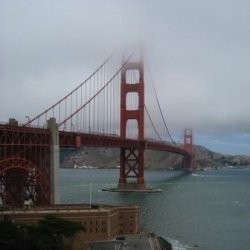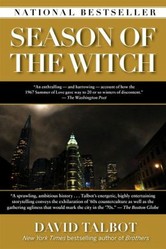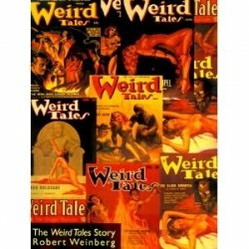 San Francisco has always been a place where the outspoken and "different" have found a home. The underdog is given a voice there. Because of this openness, the Hippie movement was able to settle into the Haight. With the goal of an idyllic society, the Diggers brought in ideas that society should be free , food, medicine and love should be free....
San Francisco has always been a place where the outspoken and "different" have found a home. The underdog is given a voice there. Because of this openness, the Hippie movement was able to settle into the Haight. With the goal of an idyllic society, the Diggers brought in ideas that society should be free , food, medicine and love should be free....
But the party got out of hand...
Drugs got harder, and loads of young runaways overloaded the city's social systems. It wasn't all "flowers in their hair" (and for those of you unfamiliar with the Bay Area... it's REALLY COLD and DAMP a lot of the time). The city didn't quite know how to deal with the influx, locals were mixed in their reactions. Interestingly enough, San Francisco was a small, predominantly Catholic town. The police and city hall all knew each other, and all went to the same Catholic High Schools. Yet, despite the difficulties in dealing with the alien culture that landed in their midst, it worked. Changes were hard on the city... but change it did.
With the changes came music. The description of how the Fillmore became the home of Janis Joplin, the Grateful Dead and Moby Grape are interesting to any music lover. I love that the great debate over whether music should be free, or a product that you pay for began here... way before the download debate.
As the 60s turned to the 70s, things turned darker in the City of Love. The Zebra Killings and the Rolling Stones Concert at Altamont cast a pall over the city. To me, Jonestown was just a strange news item about a far away cult, but Talbot explains just how much effect Jim Jones had on the politicians and leaders of the community.
Things changed further as the gay community found its voice. And it got LOUD! Harvey Milk was such a strong voice for his community... his ideas for equality were ground breaking for their time... and then along came Dan White, a politician with old school beliefs that felt he'd been pushed around too much.
After the assassination of Harvey Milk and George Moscone, Diane Feinstein took the reigns, and brought a sensible motherly evenness to the city. She saw San Francisco through the darkest days of the AIDS crisis with calm and compassion.
The book ends in the 80s... when the city's football team, the 49er's, went from bottom of the barrel to Super Bowl Champions.
From the Beat poets like Ferlinghetti, to the colorful writers who wrote about San Francisco like Herb Caen and Armistead Maupin, to the political powers like the Hallinan and Alioto families... all the people and stories weave together to make the city of San Francisco what it is today.


 San Francisco has always been a place where the outspoken and "different" have found a home. The underdog is given a voice there. Because of this openness, the Hippie movement was able to settle into the Haight. With the goal of an idyllic society, the Diggers brought in ideas that society should be free , food, medicine and love should be free....
San Francisco has always been a place where the outspoken and "different" have found a home. The underdog is given a voice there. Because of this openness, the Hippie movement was able to settle into the Haight. With the goal of an idyllic society, the Diggers brought in ideas that society should be free , food, medicine and love should be free....









 Best Poo Pourri Scenton 11/20/2015
Best Poo Pourri Scenton 11/20/2015
 Hawaiian Christmas Shirtson 09/07/2013
Hawaiian Christmas Shirtson 09/07/2013
 How to Measure Your Bra Sizeon 09/05/2013
How to Measure Your Bra Sizeon 09/05/2013
 Hunt for Treasure with a Rock and Gem Scoopon 08/30/2013
Hunt for Treasure with a Rock and Gem Scoopon 08/30/2013


All Ready to Read Season Of the Witch?
Sounds like a fascinating read. I remember the 60s news about San Francisco - it all seemed so surreal from a young teens point of view. Then I visited a few times as and adult and found it to be a beautiful city.